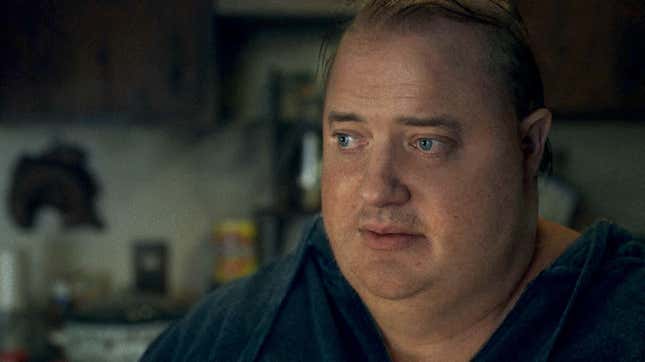‘The Whale’ Is Overwhelming in Its Cruelty—a Predictable Portrayal of Fatness
Darren Aronofsky and Brendan Fraser (in a fat suit) paint fatness as a prescription for misery in their new drama.
EntertainmentMovies

By now, anyone paying attention to the way movies are received (especially online) understands that there exists a kind of prewritten criticism for a movie like Darren Aronofsky’s The Whale, in which Brendan Fraser dons a fat suit to play Charlie, a 600-lb.-or-so writing instructor in Idaho. To many, the fat suit simply invalidates the performance of its wearer, if not the entire film. This is a knee-jerk response. To The New Yorker, Aubrey Gordon whose Instagram handle is @yrfatfriend, described the pre-release climate like this: “The impression that I’ve gotten from pretty much every fat person I know has been, like, just hunker down and wait for this to be over, because it’s going to be awful.”
The knee-jerk, though, is well earned. For years, actors have donned fat suits for glory and/or laughs, the former of which Fraser received on the fall festival circuit, which included marathon standing ovations at the Venice and Toronto film festivals. The practice of thin actors playing fat theoretically takes roles away from fat actors and threatens an insensitive portrayal from someone who doesn’t have the lived experience to truly understand what they are portraying. Acting is, of course, being what one is not, and representational fundamentalism can obstruct nuance. But the anti-fat suit argument is reasoned and prevalent enough to make The Whale’s very existence in 2022 astonishing. The predictability of its content is at such a magnitude that it is unbelievable. How can something so on-the-nose in its perpetuation of the stereotype of fatness as a potential death sentence be so lauded? Did no one think, “Maybe a movie about a fat guy made by non-fat people needs to do a little bit more than describe fatness as prescription for misery?”
-

-

-

-

-

-

-

-

-

-

-

-

-

-

-

-

-

-

-

-

-

-

-

-

-

-

-

-

-

-

-

-

-

-

-

-

-

-

-

-








































